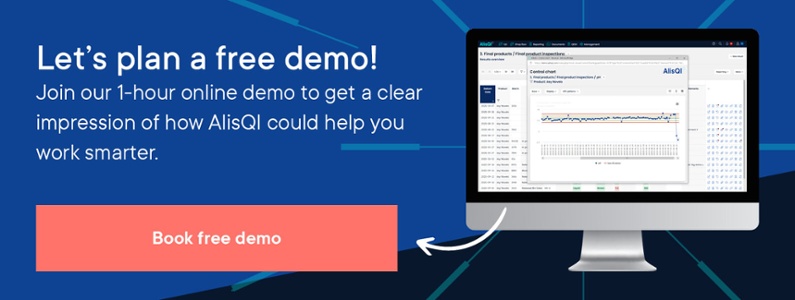Solvers help you monitor quality, apply SPC, manage equipment, and ensure traceability.

What you need to know about no-code in QMS
Even if you’ve never written a line of code in your life, you have probably heard the phrases “no-code” and “low-code”. And, when searching for a QMS solution or visiting the AlisQI website, you’ve found out that our quality management software too is in fact a no-code platform. But what is the difference between no-code and low-code, how do these technologies help manufacturers, and should you consider their advantages for your business?
The no-code/low-code buzz
There is a lot of buzz about these technologies, yet they are not buzz words – far from it. No-code and low-code platforms are the latest development in how we build and manage the apps that exist and are soon to be invented, some half a billion by 2023.
This is not a bandwagon or a trend, but the future of development, with the technology analyst Gartner forecasting that 65% of app creation will be executed on no-code / low-code platforms in the next two years.
Like so many innovations, no-code / low-code is the answer to a problem technology had to solve – the under-supply of skilled developers. Competition for experienced app developers is cut-throat, and even digital champions such as Amazon and Google cannot hold on to them – median tenure at both is just one year, or 1.1 years in the case of Google. This is concerning because if the developers we currently have are too busy managing the apps that are built already, where is the innovation going to come from?
The difference between no-code and low-code
Low-code requires programming skills but dramatically speeds up development – sometimes by as much as 80%, even for complex use cases. Projects that have been put off for years because of complexity and cost suddenly become feasible.
No-code enables non-technical business users to create simple applications or to adapt workflow, data, and analytics tools they know well. Strictly speaking, the term “no-code” is a misnomer because wherever there is software there is code. But in no-code the code is invisible and packaged in user-friendly drag-and-drop components that can be assembled to build the app or functionality.
No-code platforms are everywhere. If you have ever used WordPress to create a blog post or website, you were using no-code. The eCommerce platform Shopify is no-code as is the popular work management tool Monday.com.
AlisQI: a no-code platform praised for its user friendliness
When we built AlisQI, we wanted to create a QMS platform that is simple to set up and use and gives as much autonomy as possible to the end-user. No-code was the technology that delivered this vision.
The AlisQI no-code Quality Management System (QMS) can be implemented and adapted by the end-users of the software. It is not necessary to be a “techie”; if you can work with Google Docs and Excel spreadsheets, you’re good to go.
The QA manager of a large chemicals manufacturer implemented AlisQI with the help of just one colleague – neither has a background in IT. Not only that, but department representatives were able to set up their own part of AlisQI, “which makes the system very clear to the users because they recognize their own processes”.
This points to an additional benefit of no-code: it enhances the accessibility and inclusiveness of Quality Management. Implementation is not a “black box” from which you are excluded (because you don’t write code), but a project where you take the lead, and rightly so, because the expert of the processes and workflows that you manage is you. Even if you chose to get AlisQI or one of our partners to help with the implementation you will still be a participant, not an onlooker because no-code democratizes the entire project.
Try our no-code platform and learn how it can transform your processes.


